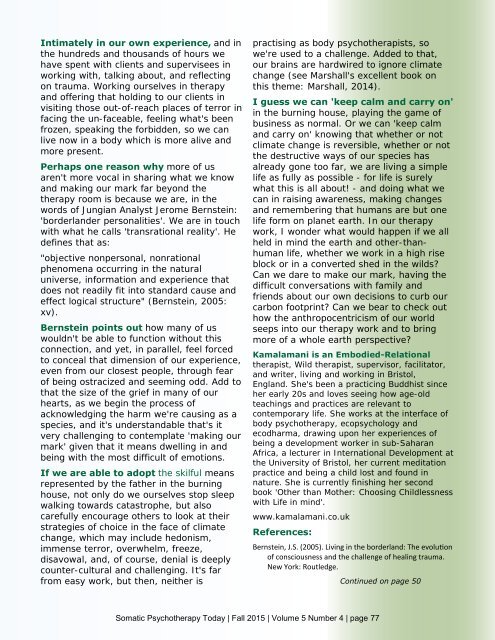Somatic Psychotherapy Today
1RCP3xp
1RCP3xp
You also want an ePaper? Increase the reach of your titles
YUMPU automatically turns print PDFs into web optimized ePapers that Google loves.
Intimately in our own experience, and in<br />
the hundreds and thousands of hours we<br />
have spent with clients and supervisees in<br />
working with, talking about, and reflecting<br />
on trauma. Working ourselves in therapy<br />
and offering that holding to our clients in<br />
visiting those out-of-reach places of terror in<br />
facing the un-faceable, feeling what's been<br />
frozen, speaking the forbidden, so we can<br />
live now in a body which is more alive and<br />
more present.<br />
Perhaps one reason why more of us<br />
aren't more vocal in sharing what we know<br />
and making our mark far beyond the<br />
therapy room is because we are, in the<br />
words of Jungian Analyst Jerome Bernstein:<br />
'borderlander personalities'. We are in touch<br />
with what he calls 'transrational reality'. He<br />
defines that as:<br />
"objective nonpersonal, nonrational<br />
phenomena occurring in the natural<br />
universe, information and experience that<br />
does not readily fit into standard cause and<br />
effect logical structure" (Bernstein, 2005:<br />
xv).<br />
Bernstein points out how many of us<br />
wouldn't be able to function without this<br />
connection, and yet, in parallel, feel forced<br />
to conceal that dimension of our experience,<br />
even from our closest people, through fear<br />
of being ostracized and seeming odd. Add to<br />
that the size of the grief in many of our<br />
hearts, as we begin the process of<br />
acknowledging the harm we're causing as a<br />
species, and it's understandable that's it<br />
very challenging to contemplate 'making our<br />
mark' given that it means dwelling in and<br />
being with the most difficult of emotions.<br />
If we are able to adopt the skilful means<br />
represented by the father in the burning<br />
house, not only do we ourselves stop sleep<br />
walking towards catastrophe, but also<br />
carefully encourage others to look at their<br />
strategies of choice in the face of climate<br />
change, which may include hedonism,<br />
immense terror, overwhelm, freeze,<br />
disavowal, and, of course, denial is deeply<br />
counter-cultural and challenging. It's far<br />
from easy work, but then, neither is<br />
practising as body psychotherapists, so<br />
we're used to a challenge. Added to that,<br />
our brains are hardwired to ignore climate<br />
change (see Marshall's excellent book on<br />
this theme: Marshall, 2014).<br />
I guess we can 'keep calm and carry on'<br />
in the burning house, playing the game of<br />
business as normal. Or we can 'keep calm<br />
and carry on' knowing that whether or not<br />
climate change is reversible, whether or not<br />
the destructive ways of our species has<br />
already gone too far, we are living a simple<br />
life as fully as possible - for life is surely<br />
what this is all about! - and doing what we<br />
can in raising awareness, making changes<br />
and remembering that humans are but one<br />
life form on planet earth. In our therapy<br />
work, I wonder what would happen if we all<br />
held in mind the earth and other-thanhuman<br />
life, whether we work in a high rise<br />
block or in a converted shed in the wilds?<br />
Can we dare to make our mark, having the<br />
difficult conversations with family and<br />
friends about our own decisions to curb our<br />
carbon footprint? Can we bear to check out<br />
how the anthropocentricism of our world<br />
seeps into our therapy work and to bring<br />
more of a whole earth perspective?<br />
Kamalamani is an Embodied-Relational<br />
therapist, Wild therapist, supervisor, facilitator,<br />
and writer, living and working in Bristol,<br />
England. She's been a practicing Buddhist since<br />
her early 20s and loves seeing how age-old<br />
teachings and practices are relevant to<br />
contemporary life. She works at the interface of<br />
body psychotherapy, ecopsychology and<br />
ecodharma, drawing upon her experiences of<br />
being a development worker in sub-Saharan<br />
Africa, a lecturer in International Development at<br />
the University of Bristol, her current meditation<br />
practice and being a child lost and found in<br />
nature. She is currently finishing her second<br />
book 'Other than Mother: Choosing Childlessness<br />
with Life in mind'.<br />
www.kamalamani.co.uk<br />
References:<br />
Bernstein, J.S. (2005). Living in the borderland: The evolution<br />
of consciousness and the challenge of healing trauma.<br />
New York: Routledge.<br />
Continued on page 50<br />
<strong>Somatic</strong> <strong>Psychotherapy</strong> <strong>Today</strong> | Fall 2015 | Volume 5 Number 4 | page 77


